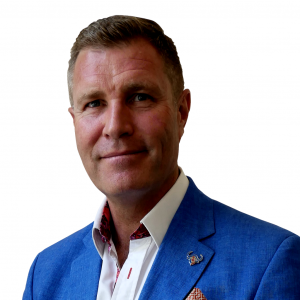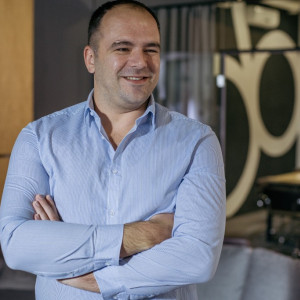How has the role of HR changed when it comes to supporting your remote workforce?
Company Interview with Fraser, Global Head of Marketing at AnswerConnect
As we have been very early adopters of remote working, we like to think that our business has grown around this as a core concept and is part of our make-up.
The HR team is always accessible for all employees, which we think is really important when people are working remotely. Via our internal app, the HR team can be contacted instantly to cover any questions our employees have. We also have HR systems and an intranet page for formal updates.
Friday newsletters, instant access to HR, & the use of GIFs in comms, Fraser and the AnswerConnect team could write a book on remote work best practices. Check out the process of how they make it all work.
Read full interview from Company Interview with Fraser, Global Head of Marketing at AnswerConnect.
Company Interview with Corine, co-founder of Sike Insights
I can’t speak for our team, but I will say that our dozens of conversations with Heads of People have given us a clear idea. Instead of simply facilitating processes, remote People Ops teams have to be really creative and nimble with their culture strategy.
Especially in a changing post-COVID world, it’s up to People Ops right now to take a proper pulse on company health and drive programs to support struggling parents, caretakers, and teammates.
I’ve heard a lot of People Ops teammates mention that they’ve become a proxy therapist; it’s clear they serve as the glue on the team.
Class is in session! Corine and her team have been studying how to incorporate remote work in their startup for months. Learn about the effective remote work practices she and the team are implementing in their new company.
Read full interview from Company Interview with Corine, co-founder of Sike Insights.
Company Interview with Maxime, Co-founder and CTO of Digicoop
As mentioned before, we are a small company with no dedicated HR person. The infrastructure is maintained by our IT person, and he can be solicited for improvements to the tools we use.
We have yearly company-wide meetings to review the way we work, and how we feel about the structure of the company.
From making employees shareholders to letting workers take control of their roles, Maxime describes Digicoop's path to remote success.
Read full interview from Company Interview with Maxime, Co-founder and CTO of Digicoop.
Company Interview with Jan, founder and CEO of Rainmaker Solutions
We have always operated remotely but also facilitated face to face meetings when required. Currently, our Head of HR has an active contact strategy with all staff to ensure everyone is coping with the pressures of the pandemic and maintaining their physical and mental wellbeing.
Remote work is built into Rainmaker Solutions' DNA. See the beliefs that push this company forward & check out their virtual activities that are building organizational trust.
Read full interview from Company Interview with Jan, founder and CEO of Rainmaker Solutions.
Company Interview with Tricia, CEO of BELAY
With the increase of remote work, in light of the current news agenda, HR leaders will have to reconsider how they are training and investing in remote talent. With COVID-19 becoming the accelerator for what is positioned to be one of the more transformational moments in the modern workplace, I believe skills-based hiring will step into the forefront, and how we train and educate employees will transform as well.
For 10 years, BELAY has been a 100% remote work company. CEO, Tricia, shares the tools that keep them thriving and how boundaries & expectations contribute to their success.
Read full interview from Company Interview with Tricia, CEO of BELAY.
Company Interview with Sharon Koifman, CEO of DistantJob
Well, considering that I have been working in the remote world for 17 years, I can't really respond to how it changed, but what I see when we do HR for the clients is that we really need to put extra effort into the personal side of things.
People in remote environments sometimes feel like they are a resource, not a person, and they don't get the feedback that they need.
HR also needs to make the candidate feel that HR has their back. If someone is not doing well, HR should be a safe zone. The boss should instruct the HR that they are even allowed to keep things private.
With DistantJob, Sharon has created a mistake-friendly environment where managers lead by example. See his tips for building trust and security among his remote teams.
Read full interview from Company Interview with Sharon Koifman, CEO of DistantJob.
Company Interview with Tammy, CEO of Workplaceless, and a remote work leader
No change since we've always been remote—however, we are developing learning experiences for remote HR professionals that dive into the fundamental differences between remote and traditional HR practices. We recently published these competencies and are developing an HR Bootcamp to launch soon.
With Workplaceless, Tammy helps companies start off on the "right remote foot." Hear how her 100% remote team stays in sync, and how she keeps her employees engaged
Read full interview from Company Interview with Tammy, CEO of Workplaceless, and a remote work leader.
Company Interview with Brad, co-founder and CEO of WebDevStudios
The obvious difference is that even our HR team is remote. They conduct their one-on-ones, employee reviews, new hire interviews, disciplinary calls, etc., using Zoom video meetings.
A challenging time finding talented local employees gave Brad the idea to make WebDevStudios 100% remote—hear about his strategies for creating a healthy remote work culture.
Read full interview from Company Interview with Brad, co-founder and CEO of WebDevStudios.
Company Interview with Ivan, CEO of Base B
Some of our clients come to us with a problem along the lines of, “I have this concept that I want to turn into a product,” and then we talk to them, identify what needs to be done, and we make suggestions as to what they need regarding their team.
If it’s a mature company rather than a startup, they might have more defined ideas in terms of how they want their team to operate, and if so, we’ll listen to their requirements, and suggest the kind of people on our local talent markets who would be of benefit to them in their team.
We then start recruiting the core of the team. For example, if they are looking for a technical lead, we look for someone with relevant domain experience and history of working in companies of similar stage and size.
Leadership qualities are the key to this core individual, as well as being product and solution-oriented.
Another example is that of an engineer. They might be a brilliant mind, with a deep interest in building algorithms, but we need to ensure that if, for example, our client is a startup, that each hire’s mentality fits the culture of the client.
We screen many people for a role, and in most cases, we interview at least ten people before presenting the first candidate for an interview with our client.
Ivan's company, Base B helps companies build effective remote teams. See the tools and training practices that allow them to excel in helping their clients.
Read full interview from Company Interview with Ivan, CEO of Base B .
Interview with Shelly, CEO of Fire Engine RED & remote work pioneer
Since we’ve always been fully remote, HR’s role has not changed.
Twenty years ago, Shelly started one of the first all-remote U.S. companies. See how remote work has given Fire Engine RED a competitive advantage & the four most important words in the employee handbook.
Read full interview from Interview with Shelly, CEO of Fire Engine RED & remote work pioneer.








